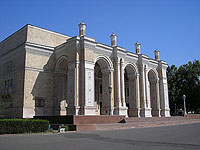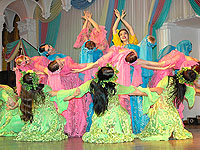 |
|
Uzbekistan - Ballet |
|||
|
In November 1918 the State opera with a ballet group was established in Tashkent. Ballet actors appeared in opera plays of the State opera as well as performed in various concert programs. The first multi-acted ballet "The Swan Lake" of M, Tchaikovsky was staged in 1925 then came a "Shakbrizada" (both staged by M. Moiseev). In 1929 the State opera saw its further consolidation with theater gaining a new status of the State Theater of Opera and Ballet. I. Arbatov is said to have served as a chief ballet-master. During the period of 1933 and 1941 the first Uzbek Opera Republican School of Ballet operated in Tashkent. Later in 1947 College of Choreography was established. In 1933 the first national ballet "Pakhta" ("Cotton") is said to have been staged by R. Roslavts at the Uzbek Musical Theater. Then in 1938 - ballet "Sbokhida" by F. Tal. In 1967 the State Academic Bolshoi ('big') Theater of Uzbekistan finally came on the scene as a solid arts institution. Plays and concerts by the Tashkent State Opera and Ballet Theater, as well as performance trips of the ballet artists from other cities and towns in Tashkent , Samarkand , Ferghana, and Bukhara attracted the attention of many experts in the field. Huge interest on the part of Uzbek people in the ballet was due to its high aesthetic taste, developed national choreography with various national dances and choreography with a classical dance at its core. During those years, the ballet group staged the ballet "Gulandom" by Brusilovsky, that for many years had been enlisted in theater's repertoire (ballet-masters: I. Arbatov, Tamara Khonim, O. Komilov, and V. Gubskaya), as well as the ballet "The Heart of Highlands" (ballet-master- E. Baranovsky ). The graduates of the dance studio of the Uzbek Theater of Music - M. Turgunbaeva, R. Karimova, F. Jalilova, Kh. Rakhimova, D. Alimov, A. Gofurov, and others - used to join the ballet troupe, who beautifully performed Uzbek classical and national dances. In 1943 the ballet "OkBilyak"wAs staged at the theater with Galiya Izmailova successfully featuring as a legendary bird of Semurgh. Since 1944 P, Yorkin led the ballet troupe. Upon his initiative the School of Ballet was established, the graduates of which, later made up the team of current ballet troupes. With classical and modern topics in theater's repertoire, the troupe staged original ballets featuring the themes of classic literature. The best original ballets are T. Mushel's "Kashmir afsonasi" - "The legend of Kashmir", M. Ashrafy's "Sevgi tumori"- "Amulet of love", L. Freygin's "Kyrk kyz" - "Forty girls", I. Akbarov's "Layli and Majnun", and others. During this period renowned actors and actresses performed in various ballets staged at the theater. They are G. Izmailova, G. Mavaeva, K. Yusupova, L. Bashirova, B. Zavyalov, and others. In 1955 Bernara Korieva joined the team, who later became a soloist of the theater. "Bolero" by Ravel, "Don Juan" by A. Feygin, "Forty girls", "Semurgh", "Temur Malik", "Tanovar", "Barishnya I khooligan" ("Lady and hooligan"), "Anna Karenina", "Anthony and Cleopatra", "V doline legend" ("In the valley of legends"), and others were best performances of 60s and 70s of the last century. Mile making ballets on the national topics, the ballet-masters and leading artists of the troupe secured new forms of classic and Uzbek traditional classic and contemporary people's dance. In 80-90s the multi-act plays and series of choreography miniatures were staged for the concert performances such as "Vecher baleta" ("The evening of the ballet"), and plays - "Navruz", "Skaz o Rustame" ("The tale of Rustam"), "OstanovisSolnlse" ("Hey Sun, stop"), "Don Quixote", and others. The young actors and actresses such as R. Karimova, Z. Davletmuratova, F. Sadullaeva, V. Kluchko, I. Kistanov, N. Alimova, and others are said to have demonstrated their best artistic qualities. The modern repertoire of the theater includes "Romeo and Juliet", "One thousand and one night", and others. Leading performers of the ballet are: Z. Davletmuratova, I. Kistanov, T. Mukhamedova, N. Shilova, M. Rakhimov, R. Nurgaliev, Z. Nurumbetov, G. Kholmatova, and others. |

